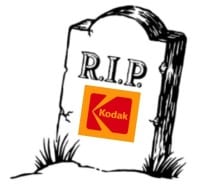We have reported frequently here about the challenges facing law firms, with mergers, technology changes, billing practices and more.
But now, yet another study has come out to show that law firms face irrelevance and face obsolescence, just like some redundant auto industry relic.
The study, from Georgetown University Law Center says the industry is failing to make the necessary “bold, proactive changes” necessary and are failing to overcome the resistance to change necessary to thrive.
The report follows other reports made by Georgetown, such as last year’s, which looked at the law industry’s changing dynamics that have been occurring since 2008.
Ignoring auto industry failures, they point to Eastman Kodak instead, a company that steadfastly refused to face major changes in their industry.
“Kodak essentially chose to ignore the fundamental shift in its market – until it was too late,” noted the 2016 Report on the State of the Legal Market, which described how Kodak failed to adapt to the rise of digital photography despite its early innovations in the technology.
That should be an “important cautionary tale” for the legal industry, the report said. “What once was a seller’s market has now clearly become a buyer’s market, and the ramifications of that change are significant.”
“Fundamental shifts such as we have seen in the market for law firm services since 2008 require firms to take a hard look at the long-term viability of operating and pricing models that have worked well in the past but may be at risk in the newly developing market environment,” James W. Jones, a senior fellow at the center and one of the report’s authors told the New York Times.
The clients are back in charge of things – if they ever were in the first place – the report says. Whereas they previously let outside firms decide organization, staffing, scheduling and pricing of legal matters “are now, in most cases, in active control of all those decisions,” the authors said.
Although some law firms have embraced some new practices and are developing or absorbing new technology and new law firm models, including outsourcing of document searches, they have yet to adopt technology or modern accounting practices and overhaul firm governance, says the Georgetown report, which was also conducted with Thomson Reuters Peer Monitor.
The report also says it is “questionable” whether the partnership structure is the appropriate way to make management decisions, particularly for major law firms who controls hundreds of millions of dollars in revenues.
“Many law firm partners believe they have an economic model that has served them very well over the years and that continues to produce good results today,” the authors found.
“They are consequently reluctant to adopt any changes that could put that traditional business model at risk.”
Certainly food for thought for law firms entering an already tumultuous 2016 beginning and something to think hard about in the months ahead.
See: The future of law firms, interview with legal consultant Tony Williams.





